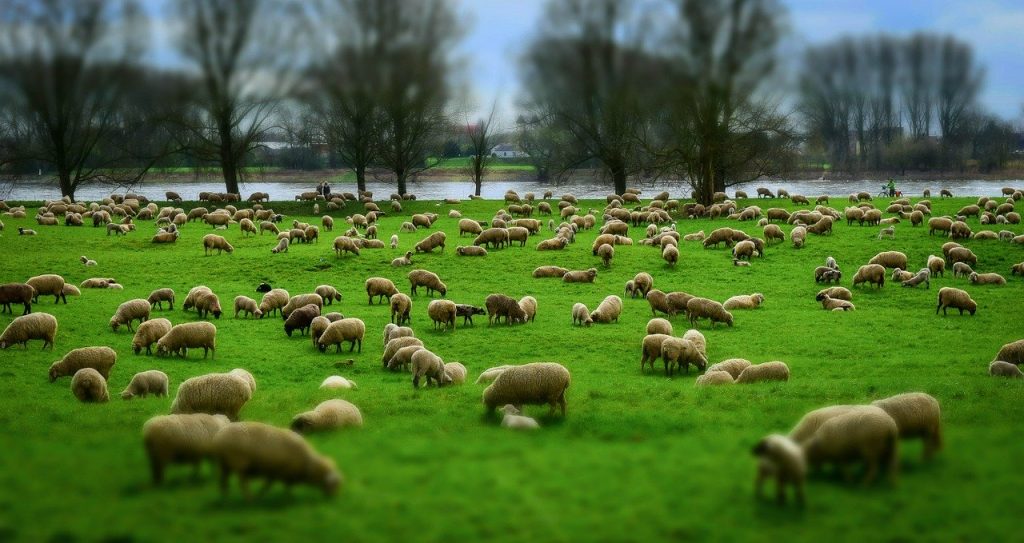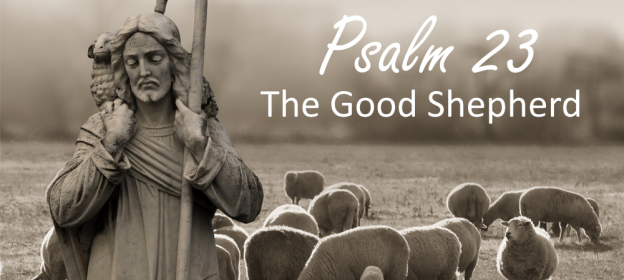He makes me lie down in green pastures.
Psalm 23:2 ESV
He leads me beside still waters.
We’re continuing our series in Psalm 23 in the midst of our national Level 4 alert, recognising that these are anxious times for many. The familiar truths in one of the most familiar passages of the bible can help us appreciate God’s power and sovereignty in this time.
Our passage: Hebrews 3:1-11 & Psalm 23:2. Preacher: Ian Bayne (5th April 2020).
Watch the Sermon
Recap
We have turned to Psalm 23 in these difficult times. In times of anxiety, we can fall back on familiar truths. For me as a former sheep farmer, this psalm has special relevance and I want to share more of this today.
Last week, looking at verse 1, we saw how we are shepherded by the LORD Almighty; our shepherd. We are his sheep and he has made a covenant (or promise) with us. With good shepherding, a flock will be productive. Likewise we are also more productive if we are well looked after, so let’s trust in a shepherd who can do this.
We are to be dependent on our shepherd so we might live by faith and trust Him to provide for us. By doing this, we appreciate our own inabilities and His power in contrast.
We’re also called to trust him because he’s good. He has saved us and given his life for us. When we go astray and fail to look to Him, He guides us and will bring us back. We are in safe hands. No one will destroy us or take us from his fold.
I give them eternal life, and they will never perish, and no one will snatch them out of my hand. 29 My Father, who has given them to me,[a] is greater than all, and no one is able to snatch them out of the Father’s hand. 30 I and the Father are one.”
John 10:28-30 ESV
Our salvation is not based on our will, by what we do, but is a free gift from God that we do not deserve. Salvation is by grace only. We can’t earn it.
Paul explains this in his letter to the Ephesian church:
For by grace you have been saved through faith. And this is not your own doing; it is the gift of God, [9] not a result of works, so that no one may boast.
Ephesians 2:8-9 ESV
Explanation
This week we’re looking at verse 2:
He makes me lie down in green pastures.
Psalm 23:2 ESV
He leads me beside still waters.
This is a picture of rest. Imagine a river running quickly through the mountains. As the rivers reach the plains below they slow down. There is much feed for sheep on the fertile plains. A place where we can relax.
Imagine a flock of sheep who are well fed. They are lying down, content in that place. As believers, we can also be content for many reasons.
To remedy a common misconception: a sheep will never lie down on its side. If a sheep is horizontal there are two possible reasons: it could be giving birth, or it could be dying.
That is not the picture here. We would say it’s sitting down with its legs folded under it. If it was still hungry it wouldn’t be sitting down.

When a sheep is lying down it will be ruminating. Sheep have 4 parts to their stomach. Like with cows, they regurgitate what they have eaten back into their mouth to grind it down further and help with digestion.
Imagine a flock of sheep lying down in a valley with plenty of feed. They are chewing the cud.
For a sheep to maintain its weight it needs around 1kg of dry matter per day. In this picture there is adequate food to grow and put on weight and there is plenty of water. That the water is still is more about the pasture being a place of rest. Sheep will drink water whether still or otherwise if they are thirsty.
Application
Good news!
Our verse today is a picture of very good news. The gospel of Jesus is how we enter into this rest.
but Christ is faithful over God’s house as a son. And we are his house if indeed we hold fast our confidence and our boasting in our hope…[8a] do not harden your hearts… [11] and I swore “they shall not enter my rest”
Hebrews 3: 6, 8a and 11 ESV
We are to “hold fast” to Jesus so that we may enter his rest.
Rest
The writer of Hebrews is quoting Psalm 93:7-11 to encourage faithfulness. The psalm talks about the Israelites in the Old Testament “harden[ing] your hearts” and “always going astray”. They could not “enter [his] rest”.
At this point the readers of the letter to the Hebrews (who knew their Old Testament well) would have remembered Psalm 95:
For he is our God, and we are the people of his pasture, and the sheep of his hand. Today, if you hear his voice, [8] do not harden your hearts, as at Meribah, as on the day at Massah in the wilderness,
Psalm 95:7-8 ESV
All of these passages are referring to the rest described in Psalm 23:2. To rest we must be dependent on the shepherd, and Psalm 23:2 gives us a picture of a shepherd providing all his sheep need.
Preparation
But, the days of plenty never last. While there’s plenty of feed in v2, in verse 4, trouble has arrived and the shepherd acts.
Even though I walk through the valley of the shadow of death, I will fear no evil, for you are with me; your rod and your staff, they comfort me.
Psalm 23:4 ESV
In our verse today we have a picture of rest and plenty, corresponding to the good times we experience in our lives. Like the sheep do, we should use this a time of preparation.
Bears need to hibernate. They prepare throughout summer and autumn for the coming winter by eating as much as they can and building fat reserves. Sheep, to a lesser extent, need to also prepare for long hard winters.
preach the word; be ready in season and out of season; reprove, rebuke, and exhort, with complete patience and teaching.
2 Timothy 4:2
The apostle Paul says to his apprentice Timothy that we need to be ready in season and out of season.
Meditation
Practically speaking, preparation starts with meditation. We’re not talking about Eastern meditation to empty one’s head. Christian mediation does the opposite.
To be ready, we need to be like the sheep in times of rest, ruminating on their food. Our food is the Word of God, and the time spent with Him in prayer. We want the Word of God to become effective in our heart in order to change us.
We want to take information in from God’s word, chew it over, and let it work in us. This will allow us to: appreciate, understand, interpret and apply God’s Word in times of trouble.
Appreciation of God
Meditation allows us a sense of appreciation. We think of verses like:
“The Rock, his work is perfect, for all his ways are justice. A God of faithfulness and without iniquity, just and upright is he.
Deuteronomy 32:4 ESV
We think over these verses, and it raises a spirit of praise and worship in us.
Cognition (understanding) of God’s Word
Meditation also allows us to grow in our cognition: our true understanding of God’s word. Scripture is a great teacher.
Interpretation of God’s Word
With a better understanding of scripture, we become better able to interpret scripture. The meaning of most scripture is plain, but where it isn’t we need to use scripture to interpret scripture.
Application of God’s Word
True action results from God’s word in our hearts. Thought over, ruminated, chewed over.
God’s words to Joshua, as he took over from Moses, show the importance of God’s word:
This Book of the Law shall not depart from your mouth, but you shall meditate on it day and night, so that you may be careful to do according to all that is written in it. For then you will make your way prosperous, and then you will have good success.
Joshua 1:8 ESV
I have stored up your word in my heart, that I might not sin against you.
Psalm 119:11 ESV
This extends to teaching our children
You shall therefore lay up these words of mine in your heart and in your soul, and you shall bind them as a sign on your hand, and they shall be as frontlets between your eyes.
Deuteronomy 11:18 ESV
Summary
We can see a picture of the good news. Hopefully you have received Jesus as your Lord and Saviour.
A picture of preparation. These are difficult times. Perhaps verse 4 is more applicable, but by the provision of God’s word during the good times, we might stand firm and draw strength from him in this time.
It’s a great privilege to say “our father who art in heaven”, and to experience the very presence of God and exist in the light of his word.
Practical helps
It’s all well and good to say we should meditate on our passage, but what does this mean. Because we have some time I want to give some practical help for doing this.
We can think of ourselves as pessimists and optimists. It’s not that someone is one or the other all of the time. Sometimes we feel more one way or the other.
Practical advice for Pessimistic times
There are plenty of passages where Gods people are pessimistic.
do not be anxious about anything, but in everything by prayer and supplication with thanksgiving let your requests be made known to God. [7] And the peace of God, which surpasses all understanding, will guard your hearts and your minds in Christ Jesus. [8] Finally, brothers, whatever is true, whatever is honourable, whatever is just, whatever is pure, whatever is lovely, whatever is commendable, if there is any excellence, if there is anything worthy of praise, think about these things. [9] What you have learned and received and heard and seen in me-practice these things, and the God of peace will be with you.
Philippians 4:6-9 ESV
Sometimes we are in an anxious state. Philippians 4:8 gives a list of things to think about and dwell on. Philippians 4:9 then says to practice them.
Practical advice for Optimistic times
If we’re optimistic then we can look to both creation and God’s word for opportunities to praise him.
General revelation: through Creation
The heavens declare the glory of God,
Psalm 19:1
and the sky above[a] proclaims his handiwork.
Ps 19 talks about God’s general revelation in verses 1-6; how God speaks to all of His creation. When we’re optimistic we can look at animals, nature, the skies. We can find opportunities to praise him for these things. All creation declares God’s glory and reveals his knowledge, and sovereign care and control.
We serve a God who takes care of us, directs us and is sovereign. He works all things out according to his purpose:
making known to us the mystery of his will, according to his purpose, which he set forth in Christ
Ephesians 1:9 ESV
Special Revelation: through His Word
The remainder of the psalm speaks about God’s special revelation through his Word in Psalm 19:7-14. The Word of God can be described in many ways:
The law of the Lord is perfect,[c]
Psalm 19:7-9
reviving the soul;
the testimony of the Lord is sure,
making wise the simple;
8 the precepts of the Lord are right,
rejoicing the heart;
the commandment of the Lord is pure,
enlightening the eyes;
9 the fear of the Lord is clean,
enduring for ever;
the rules[d] of the Lord are true,
and righteous altogether.
Psalm 19:10-13 expands on the last point around the rules, or judgements of God. They show us the truth of God, are more desirable than gold, and are a warning not to sin. They give us an assurance that if we do sin, God will forgive us.
My little children, I am writing these things to you so that you may not sin. But if anyone does sin, we have an advocate with the Father, Jesus Christ the righteous.
1 John 2:1
God’s Word gives us the power to overcome sin. As the psalmist says, so we can say:
Let the words of my mouth and the meditation of my heart
Psalm 19:14
be acceptable in your sight,
O Lord, my rock and my redeemer.
Resources
Questions? Please contact us. Inspired? Come and worship with us on Sundays.
For further study on Psalm 19, please see our Grace Devotional:



